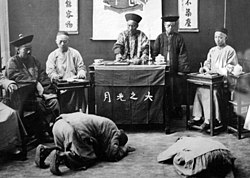Kowtowing
| Kowtowing | |
|---|---|

|
|
| Chinese name | |
| Long characters | 叩頭 / 磕頭 |
| Abbreviation | 叩头 / 磕头 |
| Pinyin | kòutóu / kētóu |
| Jyutping | kau 3 tau 4 / hap 6 tau 4 (rare) |
| Vietnamese name | |
| Quốc Ngữ | khấu đầu |
| Hán tự | 叩頭 |
| Korean name | |
| Hangeul | 고두 |
| Hanja | 叩頭 |
| Revised Romanization | godu |
| Japanese name | |
| Kanji |
叩頭 (noun) 叩頭 く (verb) |
| Kana |
こ う と う (noun) ぬ か ず く (verb) |
| Rōmaji | kōtō (noun) nukazuku (verb) |
With kowtow ( Chinese 叩頭 / 叩头 , Pinyin KouTou even 磕頭 / 磕头 , Kétou - "Butting") refers to the respectful greeting in Imperial China . The person greeting throws himself down in front of the person to be greeted at a suitable distance and touches the ground several times with his forehead. He was thrown down three times towards the emperor , each time touching the floor with his forehead three times. After completing the faeces, one often remained in a kneeling or sitting posture.
Importance of feces
During the enthronement of a new emperor, all members of the court kowtowed in a ritualized form by calling out an eunuch general or master of ceremonies. The term kowtow is used in the German-speaking world as a paraphrase for submission, integration into a hierarchy or not entirely voluntary yielding. Hence the expression "do his kowtowing" or "I have to do my kowtowing".
history
The question of faeces was by no means the only stumbling block with which the Chinese court ceremonial presented European ambassadors. But the kowtowing of his envoy showed the subordinate position of a European potentate , because the Chinese then officially declared him the tribute-bringer .
At Martín de Rada's legation, the Spaniards should kneel before the governor of Fujian . This sparked heated discussions within the delegation: the soldiers felt reminded of the prostrations and, in view of the dignity of their prince, did not want to submit to the ceremony. However, the missionaries advocated it because they believed the mission's success would be jeopardized. With the argument that this form of worship does not contain an insult to God , they finally prevailed.
In the case of the Macartney Mission in 1793, its leader, George Macartney, 1st Earl Macartney , refused to kowtow before the Chinese Emperor Qianlong and contented himself with a simple knee-fall . This lack of respect from the monarch's point of view may well have contributed to the failure of the company. The Titsingh Mission under the leadership of the Dutch businessman Isaac Titsingh , who followed the rules of the court ceremonial and carried out the kowtowing as prescribed, was more successful the following winter .
In the run-up to the British Amherst mission in 1816, William Pitt Amherst, 1st Earl Amherst , refused to kowtow in front of a dragon figure (symbol of the emperor) (in return he demanded that a mandarin kneel down in front of a portrait of George III was refused; Amherst's suggestion that every Chinese ambassador should kneel in the same way before King George III was also rejected as impossible). The mission finally failed because Amherst did not have an immediate audience with Emperor Jiaqing after his arrival in Beijing and was therefore no longer received.
Abolition of faeces
After the revolution of 1912 and the proclamation of the Republic of China , kowtow was officially abolished. However, the court, Chinese and foreign guests and even officials of the Chinese Republic still offered this form of veneration to the last emperor Puyi .
In the period following the proclamation of the People's Republic of China in 1949, kowtowing lost its importance.
